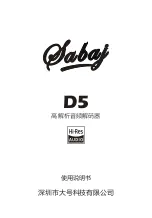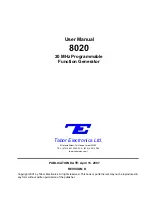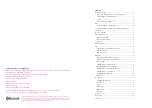
5
2.3 Ansteuerung im Digitalbetrieb
Der Multiprotokoll-Lichtdecoder wertet entweder
Signale im DCC-oder im Motorola-Format aus. Wel-
ches Datenformat der Decoder auswertet, legen Sie
bei der Einstellung der Digitaladresse fest.
Der Adressumfang ist von dem Format abhängig,
mit dem der Decoder angesteuert wird.
Motorola-Format:
320 Adressen
(1020 bei entsprechender
Zentrale)
DCC-Format:
2044 Adressen
Als Decoder mit 4 Ausgangsgruppen belegt der
Decoder standardmäßig 4 aufeinanderfolgende
Adressen, z. B. Adressen 1 bis 4 für die 4 Gruppen
1 bis 4. Aus dieser Vierergruppierung ergibt sich
das Raster für die Adressvergabe für den Decoder.
Ein Decoder – vier Ausgangsgruppen – vier Adressen!
Wenn Sie die Programmierung der Hauptadressen
mit dem roten Taster vornehmen, erledigt der Deco-
der alle Umrechnungen. Will man aber den Decoder
über CVs programmieren, so muss beachtet wer-
den, wie die Adressen im Digitalformat dargestellt
werden. Details dazu finden Sie im Kapitel 4.3.1.
2.3.1 Verhalten bei Überlastung
Bei Stromüberlastung schaltet der Decoder nach
kurzer Zeit ab. Der maximale Wert für den Strom ist
in CVs 61 – 64 einstellbar. Bitte beachten Sie, dass
jede Ausgangsgruppe in Grundeinstellung maximal
800 mA an den oder die Verbraucher liefern kann.
Dabei ist es unerheblich, ob sich dieser Strom nur
auf einen oder mehrere aktive Ausgänge verteilt. Es
wird also immer die Summe der Ströme überwacht.
3. Einbau
Montieren Sie den Decoder so, dass Kühlluft zirku-
lieren kann. Das Gehäuse ist systembedingt nicht
geschlossen. Durch die Öffnungen im Gehäuse
können auch metallische Kleinteile ins Innere gelan-
gen und den Decoder zerstören.
4. Einstellungen
4.1 Werkseinstellungen
In der Werkseinstellung ist der Decoder auf die
DCC-Adresse 1 konfiguriert. Falls erforderlich,
setzen Sie den Decoder auf Werkseinstellungen
zurück, indem Sie bei gedrückter Taste „Adresse“
die Betriebsspannung einschalten.
Weitere Konfigurationsmöglichkeiten entnehmen
Sie bitte der CV-Tabelle ab Seite 27.
2.3 Operation in digital mode
This decoder is a multiprotocol decoder sup-
porting digital signals in DCC and Motorola
format. You determine the type of protocol
to be supported when assigning an address.
The address range depends on the data format.
Motorola format:
320 addresses
(1020 with appropriate
command station)
DCC format:
2044 addresses
As a standard this decoder requires 4 consecutive
addresses. These may be, for instance, addresses
1 – 4 for groups 1 – 4. This group of 4 determines
the pattern for assigning addresses to this decoder.
One decoder – four output groups – four addresses!
If you programme the main address with the red
push-button, the decoder internally does all the
necessary computing. However, if you want to pro-
gramme the decoder with CVs, you have to bear
in mind, how addresses are displayed in digital
format. You will find more details in chapter 4.3.1.
2.3.1 Overload protection
If the decoder recognizes an electrical overload, it
switches off after a short time to protect itself against
destruction. The max. value for the current is config-
urable in CVs 61 – 64. Please bear in mind that each
output group can supply a maximum of 800 mA by
default to the consumer(s). It is immaterial if the
current is fed from one output or is divided between
several active outputs. In other words, overload pro-
tection always monitors the total current.
3. Mounting
Install the decoder in a way to allow circulation of
cooling air. Due to its conception, the housing of
the decoder is not closed. Small metallic parts may
penetrate the housing through the openings and
destroy the decoder.
4. Settings
4.1 Default settings
The factory setting of the module is the DCC
address 1. Reset the decoder to the factory default
values if necessary:
Push the “address” button,
hold it pressed and switch on the operating voltage.
You will find further configuration options in the CV
table from page 27.






































